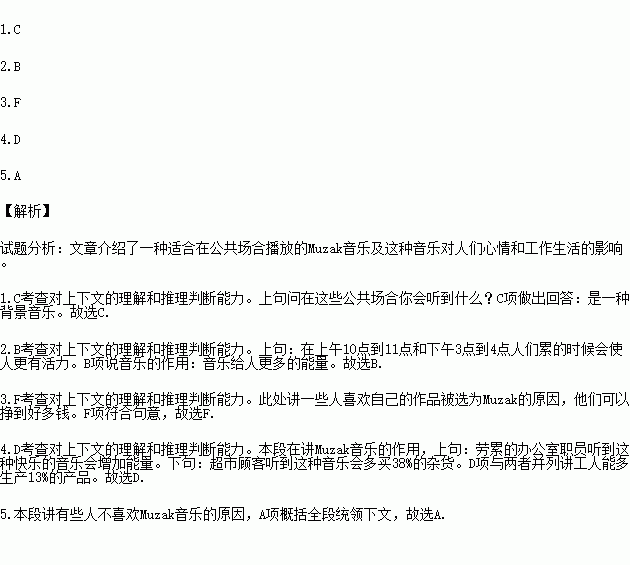题目内容
根据短文内容,从短文后的选项中选出能填入空白处的最佳选项。有两项为多余选项。
Muzak
The next time you go into a bank, a store, or a supermarket, stop and listen. What do you hear? 1. It’s similar to the music you listen to, but it’s not exactly the same. That’s because this music was especially designed to relax you, or to give you extra energy. Sometimes you don’t even realize the music is playing, but you react to the music anyway.
Quiet background music used to be called “elevator music” because we often heard it in elevators. But lately we hear it in more and more places, and it has a new name “Muzak”. About one-third of the people in America listen to “Muzak” every day. The music plays for 15 minutes at a time, with short pauses in between. It is always more lively between ten and eleven in the morning, and between three and four in the afternoon, when people are more tired. 2.
If you listen to Muzak carefully, you will probably recognize the names of many of the songs. Some musicians or songwriters don’t want their songs to be used as Muzak, but others are happy when their songs are chosen. Why? 3.
Music is often played in public places because it is designed to make people feel less lonely when they are in an airport or a hotel. It has been proven that Muzak does what it is designed to do. Tired office workers suddenly have more energy when they hear the pleasant sound of Muzak in the background. 4. Supermarket shoppers buy 38 percent more groceries.
5. They say it’s boring to hear the same songs all the time. But other people enjoy hearing Muzak in public places. They say it helps them relax and feel calm. One way or another, Muzak affects everyone. Some farmers even say their cows give more milk when they hear Muzak!
A. Some people don’t like Muzak.
B. The music gives them extra energy.
C. Music is playing in the background.
D. Factory workers produce 13 percent more.
E. Muzak tends to help people understand music better.
F. They get as much as $4 million a year if their songs are used.
G. Muzak is played in most of the big supermarkets in the world.

